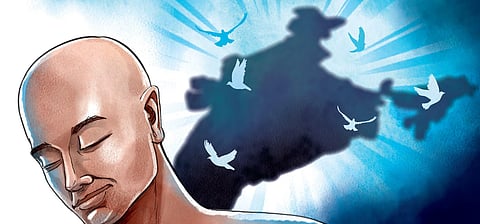

In the 1880s, John Robert Seeley pompously announced that “India is ... only a geographical expression and does not make the territory of a nation” while John Strachey declared with equal contempt that “there never was an India… no Indian nation, no people of India”. Like other British imperialist commentators, they were both obviously underestimating the inner strength of a civilisation that had arisen over millennia of coexistence, compromise and consensus.
In fact, India and Indic religions have always thrived on a spirit of accommodation with which they co-opted conquering people, from the Sakas, Huns, Turks and Pathans to valiant Ahoms, and harmonised them all within their ever-hospitable self. Brutality has hardly been the preferred option, as Ashoka realised so early and others learnt the hard way. Indians never led military expeditions abroad and even conquests by hegemonic rulers within the subcontinent led invariably to further assimilation.
Force was certainly used when states faced violent challengers, but the point is that, ultimately, it all got over with and life moved on. Bengalis and Odiyas, for instance, carry no everlasting grudge against Marathas for the depredations inflicted on them in the eighteenth century. Intolerant policies of emperors like Aurangzeb, who, incidentally, requires more dispassionate analysis, stand out in stark contrast to the conciliatory spirit of this land.
Even in recent times, those rulers who resorted to extremely vehement measures to crush murderous revolts ultimately paid with their own lives. This postulate that has been reduced to just its bare essentials and greatly simplified can surely be contested by quoting exceptions, which can also be responded to. But unless we take a helicopter view and delineate the binary themes of Indian civilisation, we will forever be lost in the labyrinthine lanes of history.
The short point spelt out by Amartya Sen in his thought-provoking book, The Argumentative Indian, and reiterated recently by Romila Thapar in her essay, Voices of Dissent, is essentially that disagreement and discord have always been integral to the ‘Idea of India’. Their ultimate resolution, even if it was partial, helped to coalesce unimaginably diverse peoples into one recognisable nation. The earliest evidence of the absorption of indigenous ideas and rituals is found in the Atharva Veda and since then, numerous contesting ideas and practices have been accommodated.
The primacy of Vedic religion was contested ab initio by the Shramanas and this gave rise to Buddhism, Jainism, the Ajivika and Ajnana cults, and even Yoga. In his books, Lokayata and Indian Atheism, philosopher Debiprasad Chattopadhyaya demonstrated the strength of materialist and atheist philosophies in challenging the very insistence on devotion, submission and otherworldliness. Thapar has also highlighted the positive role of the Charvaka dissidents. Though conflicts between core Vedic thought and others were often sharp and bitter, at that early stage, there is no evidence of physical retaliation or the crushing of dissent.
Over time, we find that the finest ideas and practices of Buddhism and other Shramana institutions were absorbed by Brahmanism, which enriched itself thereby. Thus, the religion that emerged as a consequence adopted saffron as sacred and abjured the sacrifice of cattle, giving rise to vegetarianism and ahimsa or nonviolence. Bhiksha (alms), Bhikshu (monks) and Mutts (monasteries) were other cardinal contributions that post-Vedic Brahmanism accepted from its rivals. Come to think of it, if Vedic sacrifice and Brahmanical rites had been left unchallenged, most of us would perhaps still be consuming voracious amounts of beef.
Dissent can, therefore, hardly be equated with sedition and steamrolled with ‘macho’ measures. Repeated electoral victories often convey a sense of entitlement and may trigger urges to contain or overawe those who do not concur. But as mentioned, resentment also plays a positive role in steering regimes and philosophies to more acceptable middle grounds that have withstood the test of time. We may also do well to remember that India was never one continuous homogeneous unitary state.
Much of the subcontinent was periodically unified under ruthless centralised commands, but put together, these pan-Indian empires account for less than five centuries of, say, the three millennia and more that ‘India’ was recognised. Even then, neither were all regions covered nor was any absolute uniformity imposed. Regional cultures and priorities flourished throughout history and India never foisted one system over a vast land, unlike what the Russian empire did through its mandatory ‘Russification’ policy.
From the 3rd century BC, China has carried out a merciless ‘Sinoisation’ of all ethnic groups, with fire and sword. Unlike America, where WASP (white, Anglo-Saxon Protestant) culture is drilled into everyone else, India never attempted homogenisation, though some narrow-minded extremists nurse fond hopes of linguistic homogeneity.
Indian history reveals that widely diverse linguistic, ethnic and religious groups came together as one solid nation mainly because they desired to be together and found much in common to be proud of. In such circumstances, it would be unwise for any regime to treat every emblem of cultural autonomy to be heretical or every protest as treason. Such outbursts, even if they are intemperate, indicate that the system’s wiring is overheated and a fuse has blown off.
No regime can rule through accusations, condemnation, surveillance and domination. Dialogue and discussions are imperative so that course corrections can be made, even on farm laws that were rushed through Parliament without adequate debate. After all, India has always stood for accord, not discord.
Jawhar Sircar (Tweets @jawharsircar)
Retired civil servant. Former Culture Secretary and ex-CEO, Prasar Bharati